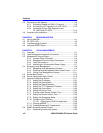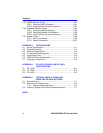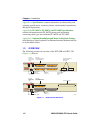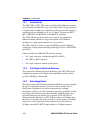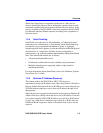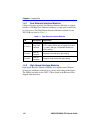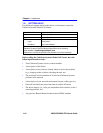
Overview
2H23-50R/2H33-37R User’s Guide 1-5
When Auto-Negotiation is supported at both ends of a link, the two
devices dynamically adjust to full or half duplex operation based on the
maximum capability that can be reached between the two devices. If the
device connected to the FE-100TX cannot auto-negotiate, the FE-100TX
Fast Ethernet Interface Module operates according to the capabilities of
the other device.
1.3.4 SmartTrunking
SmartTrunk, also referred to as SmartTrunking, is Cabletron Systems’
terminology for load balancing or load sharing. SmartTrunk technology
provides an easy-to-implement mechanism to group, or aggregate,
multiple physical links together to scale the backbone bandwidth beyond
the limitations of a single link. All links are user-configurable so
administrators can scale the backbone bandwidth by adding SmartTrunk
links. The SmartTrunk benefits are as follows:
•
All purchased bandwidth is used.
•
Distributed, resilient links increase reliability and performance.
•
Multiple technologies are supported within a single trunk for
maximum flexibility.
For more information about SmartTrunk, refer to the Cabletron Systems
SmartTrunk User’s Guide
.
1.3.5 Runtime IP Address Discovery
This feature enables the 2H23-50R or 2H33-37R (device) to
automatically accept an IP address from a Boot Strap Protocol (BootP) or
Reverse Address Resolution Protocol (RARP) server on the network into
NVRAM without requiring a user to enter an IP address through Local
Management.
When the device is connected to the network and powered up, Runtime IP
Address Discovery (RAD) checks the device for an IP address. If one has
not yet been assigned (2H23-50R IP address set to 0.0.0.0), RAD checks
to see if any of the device’s interfaces have a link. If so, RAD sends out
RARP and BootP requests to obtain an IP address from a server on the
network.




